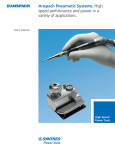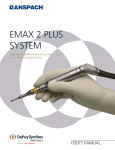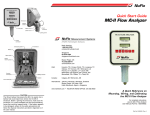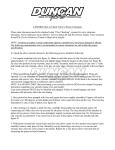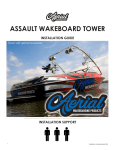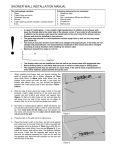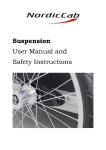Download Holte Perforator User Guide
Transcript
PERFORATOR USER GUIDE Holte Manufacturing Company, Inc. 25310 Jeans Road, Veneta OR 97487 Ph (541)935-5054 Fax (541)935-5430 www.drilling.com CONTENTS Parts List... .............................................3 Perforator Assembly.. ............................4 Adapter Shoes... ..................................10 Air Pressures........................................11 Travel Stops..........................................11 Cutter Wheels.......................................11 2 3 Step 4. Slide chrome rod through spring with a washer on each side of the spring. Install the rod through the cylinder and piston. ASSEMBLY Step 1. Place gasket over holes. Step 2. Insert piston into cylinder with the shallow chamfered end facing outward. There are no O-rings on the piston. Step 5. Place the stop tube between the piston and the yoke. Note: Without the stop tube, the piston can not push the yoke out. Step 3. With piston in cylinder, position cylinder over gasket and bolt it to the perforator body with a 2-3/8”x1” allen head cap screw. 4 5 Step 6. Screw the chrome rod into the yoke with the chamfered side of the yoke facing down. Step 8. Slide cutter wheel and axle pin up into yoke. Insert axle pin bolt through yoke and tighten. Step 7. Place cutter wheel into perforator body and slide axle pin through cutter wheel. Step 9. Photo of perforator body assembly complete. 6 7 QUICK TEST Step 12. The pop off valve is installed as one unit by threading it into the lower housing. Step 10. Tighten spring loaded rod with a ¾” wrench. After tightening chrome rod, push assembly through entire stroke to insure there is no binding. Step 11. Place the protective housing over the cylinder and rod. This is tightened handtight or slightly snugged with a wrench. 8 9 ADAPTER SHOES OPERATING HINTS Adapter shoes are available to allow the 6” perforator to perforate up to 12” pipe. Larger perforators cut up to 26” pipe. AIR PRESSURE Air or water pressure of at least 60-70 PSI is required to set the wheel into cutting position. When the perforator is under water, you must add air or water to equal the pressure outside the perforator plus at least 40 PSI. Using more pressure does not cause a problem. The perforator pop off or developing valve opens at approximately 80 to 90 PSI. Down pressure on the drill pipe makes the wheel rotate and punch holes. PERFORATOR ORIENTATION Perforations are made when the tool is moving downward from top to bottom. PERFORATIONS As a general rule, 3 to 4 columns of perforations is recommended for 6” to 8” pipe. For 10” to 12” pipe, 6 to 8 columns of perforations are recommended. TRAVEL STOPS Travel stops are attached to the perforator body to restrict the reach of the wheel. For casing thinner than .250” remove the travel stops. This allows the wheel to extend out of the perforator further for the thinner walled casing. Adapters slide onto the back of the perforator body and bolt to the holes which line up on the sides of the perforator. 10 CUTTER WHEELS Remember to retract the cutter wheel before rotating. Frequently inspect cutter wheel for wear. Inspect for excessive wear between blade and axle pin. Use PVC cutter wheels when perforating PVC pipe. 11








